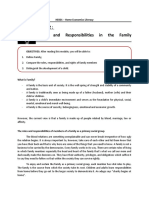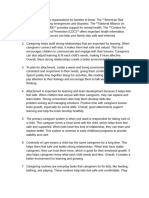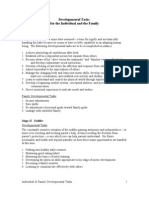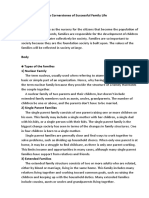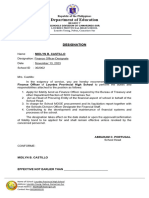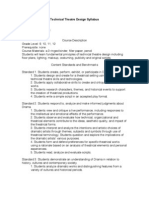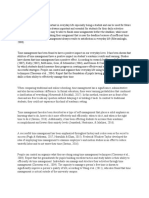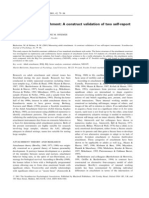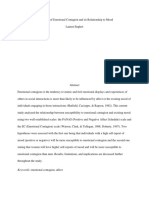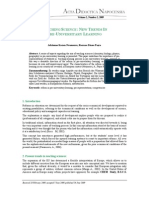0 ratings0% found this document useful (0 votes)
23 viewsContemporary Family Life
Contemporary Family Life
Uploaded by
ChristyThe document discusses 8 moral values that can be implemented in families: self-compassion, empathy and kindness toward others, responsibility, honesty, integrity, implementing and respecting boundaries, family time, and perseverance. It provides examples of how each value can be taught and upheld by all family members to help create a cohesive foundation for the family unit.
Copyright:
© All Rights Reserved
Available Formats
Download as PDF, TXT or read online from Scribd
Contemporary Family Life
Contemporary Family Life
Uploaded by
Christy0 ratings0% found this document useful (0 votes)
23 views30 pagesThe document discusses 8 moral values that can be implemented in families: self-compassion, empathy and kindness toward others, responsibility, honesty, integrity, implementing and respecting boundaries, family time, and perseverance. It provides examples of how each value can be taught and upheld by all family members to help create a cohesive foundation for the family unit.
Original Title
Contemporary-Family-Life
Copyright
© © All Rights Reserved
Available Formats
PDF, TXT or read online from Scribd
Share this document
Did you find this document useful?
Is this content inappropriate?
The document discusses 8 moral values that can be implemented in families: self-compassion, empathy and kindness toward others, responsibility, honesty, integrity, implementing and respecting boundaries, family time, and perseverance. It provides examples of how each value can be taught and upheld by all family members to help create a cohesive foundation for the family unit.
Copyright:
© All Rights Reserved
Available Formats
Download as PDF, TXT or read online from Scribd
Download as pdf or txt
0 ratings0% found this document useful (0 votes)
23 views30 pagesContemporary Family Life
Contemporary Family Life
Uploaded by
ChristyThe document discusses 8 moral values that can be implemented in families: self-compassion, empathy and kindness toward others, responsibility, honesty, integrity, implementing and respecting boundaries, family time, and perseverance. It provides examples of how each value can be taught and upheld by all family members to help create a cohesive foundation for the family unit.
Copyright:
© All Rights Reserved
Available Formats
Download as PDF, TXT or read online from Scribd
Download as pdf or txt
You are on page 1of 30
1. Family provides stability.
When things are tough, having a
strong family support system can help
make things a little bit easier.
2. Family provides a sense of belonging.
We all need a place to call home, and family
is a great place to find that.
3. Family provides a sense of continuity.
When something important happens in our
lives, we want to make sure that the people we
love are there to share in the experience.
4. Family provides a sense of safety.
When we are surrounded by people who care
about us, we are much less likely to be in danger.
5. Family provides a sense of guidance.
We all need someone to show us the way in life,
and our families are usually the best people for
the job.
1. Identification Function
Within the family an individual discovers and
establishes his own identity as a person and as a
sexed being.
He also learns what patterns of behavior relate to
his identity.
2. Educating Function
This function is related to the previous one and refers to the
formative role of the family nucleus. It is in the family where the individual
learns to talk, to walk and to behave, among other learnings.
In fact, it is normal to listen in educational institutions that require
family support to be able to fully fulfill their mission of educating people.
This function has as critical term the first child of the individual. At
that moment is when they set the fundamental knowledge for their
development in society. After that, education plays a reinforcing role in this
learning process.
2. Educating Function
This function is related to the previous one and refers to the
formative role of the family nucleus. It is in the family where the individual
learns to talk, to walk and to behave, among other learnings.
In fact, it is normal to listen in educational institutions that require
family support to be able to fully fulfill their mission of educating people.
This function has as critical term the first child of the individual. At
that moment is when they set the fundamental knowledge for their
development in society. After that, education plays a reinforcing role in this
learning process.
3. Communication Function
The educative function is related to a communicative
function, because it teaches the individual the signs,
symbols and codes necessary to be understood in the
society in which he lives.
This communication function is important because it
impacts on how the individual will relate to his or her peers.
4. Socializing function
As in the case of education, this is a shared function between
the family and educational institutions. It relates to the
development of the ability to interact with others.
Socializing implies to be linked intellectually, affectively and
even economically with other people, and for this, certain patterns
of behavior must be fulfilled. That is, people adapt to the social
demands of the environment in which they grow.
It is a function that directly affects the survival of a system or
social order, since it is transmitted from generation to generation.
5. Cooperation and Care Function
A family is also the first instance of security and protection for a person. The human
life cycle itself requires that other individuals of the same species take care of the smaller
and defenseless.
It is the family nucleus that is in charge of providing shelter and food for its members,
especially the younger ones.
In fact, it is believed that the human being is of the species that is born more
vulnerable to diseases or to the attack of some predator. For this reason, family protection
becomes a vital necessity.
In addition, each family member is expected to contribute to the care and growth of
others. This contribution can be economic, affective, educational, among others.
Family support is born of the members' sense of belonging. Knowing that they share
beliefs, projects and affections makes them become involved and feel responsible for each
other.
6. Affective Function
Although it does not appear first in this list, it is one of the
basic functions of the family because people require food for their
bodies and, almost to the same extent, affection and affection.
The human being is nourished by that affection he receives in
the family, he learns to feel it for others and to express it.
The way in which emotions are expressed in the family
affects the way in which people will manage their emotions in other
environments: work, school, community, among others.
7. Economic Function
Living as a family implies that its members must
contribute to the productive forces of their society. It also
implies that they must consume goods and services. In this
way, the economic machinery of nations is kept active.
In addition, it is in the family where the person learns
economic concepts such as budget, savings, accounts
payable, investments, expenses and other concepts.
8. Reproductive Function
Another of the basic functions of a family is to
preserve the species by reproducing its members.
But in addition to biological reproduction,
there is also a cultural reproduction through the
socializing work of the family.
9. Normative Function
In the family, the individual acquires his first frame of
reference on the rules and norms he must fulfill.
Each family sets its own rules and behavior rules to
maintain harmony among the members of your household.
These rules also facilitate relationships between
members of a society, as they clearly delineate individual
roles and the way in which authority is perceived.
10. Emancipatory Function
The family is the one that offers the sense of
independence and autonomy necessary for the good
development of people's lives. In the family the individual
understands the boundaries between dependence and
independence.
In this nucleus are found the tools that favor the growth
and the maturation of the individual, that will make it apt to
go of its own inside the society.
References
Edenet (s / f). Six functions of the family. Retrieved from: hrsbstaff.ednet.ns.ca
García, Alejandro (2016). Family concept and functions. Recovered from: psicologiayconducta.com
Quiroz, Cynthia (s / f). The Family: its needs and functions. Recovered from: medicosfamiliares.com
R Ericka, (2009). Family, types and functions. Recovered from: familia-nucleoprimario.blogspot.com
Rodríguez, Nadia (2012) An approach to the family from a sociological perspective. Retrieved from:
eumed.net
Sánchez, J. TV and family. Family communication, passivity and school performance. In: Society
and Utopia, n.2, Madrid, set. 1993, pp.
Socioligicus (2001). Sociological aspects of the family institution: the role of the family. Recovered
from: sociologicus.com
Soriola Elizabeth (2017). Meaning and functions of family and its importance as a social institution.
Recovered from: naij.com
1. Self-compassion
Self-compassion means you should be kind to yourself first.
It also means you should avoid negative self-talk.
If this is one of your family values, it’s important to
teach everyone in your family how to be compassionate to
themselves. By learning how to be kind to themselves,
they’ll also learn how to be compassionate toward others.
2. Empathy and kindness toward others
Once the youth in your family learn how to be kind to
themselves, they have a solid base to be kind and
empathetic toward others.
When you implement this value, you can learn to see
the world through other people’s eyes. This can inform the
way you treat others.
3. Responsibility
When responsibility is part of your moral values, those
in your family prioritize taking responsibility for their own
actions.
But learning responsibility is also an amazing way for
younger family members to learn how to contribute to the
household. They can grow into a specific role within the
family.
4. Honesty
Honesty is an important value that many adults like to
uphold. However, not all adults practice honesty with
children.
If you decide to implement honesty as a family value,
it’s important that everyone within your family upholds this
value to everyone else, regardless of age. Children will learn
by seeing what you do.
5. Integrity
Some people confuse integrity with honesty. However,
they’re not the same.
Integrity requires honesty. But it goes deeper than just being
honest.
Someone with integrity is reliable and trustworthy. They
also value openness. Plus, someone with integrity will
usually be responsible and accountable for their own
actions.
6. Implementing and Respecting Boundaries
Everyone should be able to uphold their own
boundaries. But not all families make it a point to set and
prioritize those boundaries.
Families who value boundaries need to learn how to
communicate effectively. That’s because it’s difficult to
remind others of your boundaries when you’re not sure how
to communicate them.
7. Family time
When family time is part of your values, making
space for quality time together is a priority.
Everyone in a family will have other things going on in
their lives. However, this value ensures that everyone
sets aside the time to regroup and bond with each
other.
8. Perseverance
Teaching and prioritizing perseverance and hard work
is a way to help your family not give up at the first signs of
failure.
Perseverance helps to normalize failure. It helps children
to accept that failure can be an important part of learning.
It also teaches them how to be patient when they don’t
immediately get the end result they were hoping for.
You might also like
- Forming The Heart and Mind of GMRC TeacherDocument11 pagesForming The Heart and Mind of GMRC TeacherTom Cyrus Vallefas100% (5)
- Family Systems TheoryDocument8 pagesFamily Systems TheoryEdwin Estrera100% (1)
- How Practical Life Exercises Create HarmonyDocument8 pagesHow Practical Life Exercises Create HarmonyPatrick DaniardNo ratings yet
- Behavioural Pediatrics and Pediatric NursingDocument21 pagesBehavioural Pediatrics and Pediatric Nursingraji100% (8)
- Alfred Schutz, Thomas Luckmann, The Structures of Life-World v. 2Document353 pagesAlfred Schutz, Thomas Luckmann, The Structures of Life-World v. 2Marcia Benetti100% (2)
- Kahneman CommentaryDocument2 pagesKahneman CommentaryBruce Garcia67% (3)
- Robbins Mgmt11 Tb07Document34 pagesRobbins Mgmt11 Tb07Mohammed Al Murisi100% (1)
- Contemporary Family LifeDocument30 pagesContemporary Family LifeChristyNo ratings yet
- MarianDocument12 pagesMarianElieza Mae BabaranNo ratings yet
- Topic 2-Roles and Responsibilities in The FamilyDocument7 pagesTopic 2-Roles and Responsibilities in The FamilyMARY GRACE CABILI100% (1)
- Name: Frannie Sarkar Department: History Honours Year: Second Year Sem 2 Subject: Education (Elective) Teacher: ND Ma'Am TOPIC: Identify 10 Ways in Which A Family Has SocializedDocument4 pagesName: Frannie Sarkar Department: History Honours Year: Second Year Sem 2 Subject: Education (Elective) Teacher: ND Ma'Am TOPIC: Identify 10 Ways in Which A Family Has SocializedFrannie SarkarNo ratings yet
- Family and Consumer Sciences Teacher Study GuideDocument50 pagesFamily and Consumer Sciences Teacher Study GuideRaquel Schwartz Vazquez100% (2)
- Explain The Roles and Responsibilities of CaregiverDocument3 pagesExplain The Roles and Responsibilities of CaregiverJemma Rose TegioNo ratings yet
- Six Functions of The FamilyDocument6 pagesSix Functions of The FamilyCarl Errol CabaliNo ratings yet
- DIASS 4-5.docx-WPS OfficeDocument8 pagesDIASS 4-5.docx-WPS OfficeJohn Rodolf LauretaNo ratings yet
- Chapter 1 Home and FamilyDocument26 pagesChapter 1 Home and FamilyAli Zandra De LeonNo ratings yet
- Modules For Cahoa SpdaDocument7 pagesModules For Cahoa Spdachristeentomale1207No ratings yet
- FamilyDocument4 pagesFamilyDelia BratzchNo ratings yet
- 9) 1. Describe The Nature vs. Nurture Debate. Which Do You Think Has A Greater Influence On Humans-Nature or Nurture?Document5 pages9) 1. Describe The Nature vs. Nurture Debate. Which Do You Think Has A Greater Influence On Humans-Nature or Nurture?onlineinstitute2002No ratings yet
- CH.3 QuestionsDocument2 pagesCH.3 QuestionsMara Grace WoodsNo ratings yet
- How Words Have Power and Meaning and Does Infect and Affect Our HealthDocument6 pagesHow Words Have Power and Meaning and Does Infect and Affect Our Healthhostcares9100% (4)
- Social InstitutionDocument8 pagesSocial InstitutionRanvijay K. SinghNo ratings yet
- Working With Children and Family Module 3Document7 pagesWorking With Children and Family Module 3Neha NizamNo ratings yet
- Home Economics 2Document64 pagesHome Economics 2Kaia FerdivilaNo ratings yet
- Session 3Document31 pagesSession 3Noha SayedNo ratings yet
- Developmental Tasks For The Individual and The FamilyDocument6 pagesDevelopmental Tasks For The Individual and The FamilyJerryca Mae BarrotNo ratings yet
- Social Literacy For EditDocument30 pagesSocial Literacy For EditshainamagdayaoNo ratings yet
- Building and Maintaining Relationships: Lesson 11Document3 pagesBuilding and Maintaining Relationships: Lesson 11Jherlene Anne Javier AlcanseNo ratings yet
- What Is Child Social DevelopmentDocument3 pagesWhat Is Child Social Developmentroserene_boragayNo ratings yet
- Sociology-Assessment: Q. Discuss The Basic Functions of FamilyDocument2 pagesSociology-Assessment: Q. Discuss The Basic Functions of FamilyAkirasNo ratings yet
- Family ValuesDocument9 pagesFamily ValuesКаріна ВолинецьNo ratings yet
- Begood Midterm NotesDocument7 pagesBegood Midterm Notes孙美美Ezra Paola TaysonNo ratings yet
- Family Values As The Cornerstones of Successful Family LifeDocument4 pagesFamily Values As The Cornerstones of Successful Family LifeВікторія КомандиренкоNo ratings yet
- Soc Phil-M4 BDocument4 pagesSoc Phil-M4 BHerald GesulgaNo ratings yet
- Chapter 2 Personal Vaues and Its DevelopmentDocument44 pagesChapter 2 Personal Vaues and Its Developmentnympha Lejas100% (1)
- What Is Attachment ParentingDocument24 pagesWhat Is Attachment Parentingrelax5810No ratings yet
- MODULE 01 UNIT I Family Family HealthDocument9 pagesMODULE 01 UNIT I Family Family HealthGaspay GillianeNo ratings yet
- Outline Social WellnessDocument11 pagesOutline Social WellnessRodel CruzNo ratings yet
- Relating To Marriage or The Relationship Between Husband and Wife. On The Other HandDocument3 pagesRelating To Marriage or The Relationship Between Husband and Wife. On The Other HandgequilloNo ratings yet
- King Solo 5Document6 pagesKing Solo 5rolandagyei65No ratings yet
- Személyes Vonatkozások, CsaládDocument3 pagesSzemélyes Vonatkozások, CsaládAnna JósvaiNo ratings yet
- The FamilyDocument5 pagesThe FamilyThispage WasclonedNo ratings yet
- Lesson 3: Maintaining Desirable Family Values and Harmonious RelationshipDocument5 pagesLesson 3: Maintaining Desirable Family Values and Harmonious RelationshipKitkatNo ratings yet
- The Importance of The Role of The Family in ProtecDocument3 pagesThe Importance of The Role of The Family in Protecfakta secondNo ratings yet
- A. SocializationDocument10 pagesA. SocializationMunib Brahim Jr.100% (1)
- Personal Development ReviewerDocument10 pagesPersonal Development Reviewerjanicesebio61No ratings yet
- Multicultural Education - Chapter 3 (BSIT)Document14 pagesMulticultural Education - Chapter 3 (BSIT)extrainfinixNo ratings yet
- PERDEVQ4MOD6LESSON262NDSEMDocument13 pagesPERDEVQ4MOD6LESSON262NDSEMJolina Imbuido ValdezNo ratings yet
- Cross Culture Understanding FAMILY VALUEDocument8 pagesCross Culture Understanding FAMILY VALUEWharyantiNo ratings yet
- Task AssessmentDocument2 pagesTask AssessmentShiela SalvosaNo ratings yet
- Family Dynamics1Document71 pagesFamily Dynamics1Sr Chato BalancinNo ratings yet
- GoalsDocument17 pagesGoalsMark Catabijan CarriedoNo ratings yet
- Page 1 of 5 Homeroom Guidance 9 First Quarter-Module 3 Week 3Document5 pagesPage 1 of 5 Homeroom Guidance 9 First Quarter-Module 3 Week 3phoebecruz636No ratings yet
- Personal Development3Document3 pagesPersonal Development3Carl Angelo MartinNo ratings yet
- NSTP Self Awareness Module 3Document42 pagesNSTP Self Awareness Module 3caviesabinanoNo ratings yet
- Family and FriendsDocument3 pagesFamily and FriendsHari SahooNo ratings yet
- Lesson 3 - The Role of The Family in Child DevelopmentDocument49 pagesLesson 3 - The Role of The Family in Child DevelopmentChona Bautista100% (1)
- Social and Mental DevelopmentDocument7 pagesSocial and Mental DevelopmentTricia MendozaNo ratings yet
- GMRC Act 1Document5 pagesGMRC Act 1Gian GuiananNo ratings yet
- The PoemDocument5 pagesThe Poemsamaud0407No ratings yet
- Connected Parenting: Building Confidence, Empathy, and Resilience in Your KidsFrom EverandConnected Parenting: Building Confidence, Empathy, and Resilience in Your KidsNo ratings yet
- Module 3Document7 pagesModule 3yeshapaje1No ratings yet
- DESIGNATION Finance OfficerDocument1 pageDESIGNATION Finance OfficerChristyNo ratings yet
- Ethics Natural LawDocument20 pagesEthics Natural LawChristyNo ratings yet
- COVER PAGE UpdatedDocument1 pageCOVER PAGE UpdatedChristyNo ratings yet
- Dimensions of A Human PersonDocument12 pagesDimensions of A Human PersonChristyNo ratings yet
- Lesson PlanDocument4 pagesLesson PlanChristyNo ratings yet
- Gastilo, Christy L - Reflection PaperDocument5 pagesGastilo, Christy L - Reflection PaperChristyNo ratings yet
- Rebecca Romero: Professional SummaryDocument2 pagesRebecca Romero: Professional Summaryapi-482402080No ratings yet
- Tier 1 LessonDocument9 pagesTier 1 Lessonapi-658863187No ratings yet
- The Secret Principles of Genius The Key To Unlocking Your Hidden Genius Potential PDFDocument3 pagesThe Secret Principles of Genius The Key To Unlocking Your Hidden Genius Potential PDFtharunNo ratings yet
- Technical Theatre Design SyllabusDocument5 pagesTechnical Theatre Design Syllabusanon-579447No ratings yet
- Overcoming Cultural Barriers For Innovation and Knowledge SharingDocument14 pagesOvercoming Cultural Barriers For Innovation and Knowledge SharingAmshaz_2511No ratings yet
- HMEF5043 Exam Sample 2018Document5 pagesHMEF5043 Exam Sample 2018Rinkie YeapNo ratings yet
- LearningDiffEarlyYrs WLib PDFDocument41 pagesLearningDiffEarlyYrs WLib PDFvanag99152No ratings yet
- Phil Agre - Toward Critical Technical PracticeDocument10 pagesPhil Agre - Toward Critical Technical PracticepdavilaNo ratings yet
- RRL FinalDocument2 pagesRRL FinalJustin BidanNo ratings yet
- Emotions, Five Souls and Their Specific Acupuncture PointsDocument11 pagesEmotions, Five Souls and Their Specific Acupuncture PointsTamda Shitake100% (1)
- Developing Individuals, Teams and OrganizationsDocument44 pagesDeveloping Individuals, Teams and OrganizationsKevin ParkerNo ratings yet
- (Developmental Reading) : Atty. Rached P. RondinaDocument11 pages(Developmental Reading) : Atty. Rached P. RondinaArJhay ObcianaNo ratings yet
- Deep Questions To Ask Yourself To Change Your Life AroundDocument2 pagesDeep Questions To Ask Yourself To Change Your Life Aroundlarisa schiopuNo ratings yet
- Measuring Adult AttachmentDocument8 pagesMeasuring Adult AttachmentLisaDarlingNo ratings yet
- Is The Art of Conversation Dying?Document2 pagesIs The Art of Conversation Dying?BiznesNo ratings yet
- Ptet Complete GuideDocument6 pagesPtet Complete GuideDebkanta DasNo ratings yet
- Big 5 Personality WorkplaceDocument3 pagesBig 5 Personality WorkplaceDSNo ratings yet
- AutobiographyDocument5 pagesAutobiographyAnn FuentesNo ratings yet
- The Impact of Emotional Contagion and Its Relationship To Mood PDFDocument19 pagesThe Impact of Emotional Contagion and Its Relationship To Mood PDFDi CaNo ratings yet
- Heidegger Notes - DaseinDocument2 pagesHeidegger Notes - DaseinMeg ColborneNo ratings yet
- Article 2 2 7Document8 pagesArticle 2 2 7gicajeguNo ratings yet
- Performance Task Lesson PlanDocument6 pagesPerformance Task Lesson Planapi-288713007100% (1)
- Phantom Limbs Thematic EssayDocument4 pagesPhantom Limbs Thematic EssayQi NNo ratings yet
- ID Motivasi Wisatawan Mengunjungi Objek WisDocument15 pagesID Motivasi Wisatawan Mengunjungi Objek WisWindi Guswirno HediNo ratings yet
- Transcultural Nursing and SpecializationDocument3 pagesTranscultural Nursing and Specializationsagami.gNo ratings yet
- Subiecte Bac 2010Document4 pagesSubiecte Bac 2010unutulmazNo ratings yet
- Extrovert and Introvert Language LearnerDocument2 pagesExtrovert and Introvert Language LearnerRia LestariNo ratings yet









